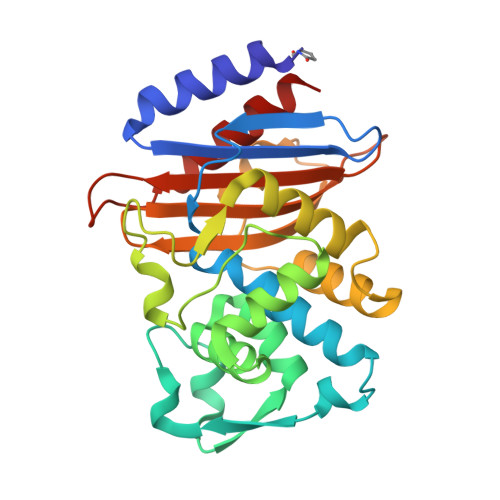Active-Site Druggability of Carbapenemases and Broad-Spectrum Inhibitor Discovery.
Torelli, N.J., Akhtar, A., DeFrees, K., Jaishankar, P., Pemberton, O.A., Zhang, X., Johnson, C., Renslo, A.R., Chen, Y.(2019) ACS Infect Dis 5: 1013-1021
- PubMed: 30942078
- DOI: https://doi.org/10.1021/acsinfecdis.9b00052
- Primary Citation of Related Structures:
6EFJ, 6M7I, 6MD8, 6MDU, 6MEY, 6MIA, 6MLL, 6MNP - PubMed Abstract:
Serine and metallo-carbapenemases are a serious health concern due to their capability to hydrolyze nearly all ¦Â-lactam antibiotics. However, the molecular basis for their unique broad-spectrum substrate profile is poorly understood, particularly for serine carbapenemases, such as KPC-2. Using substrates and newly identified small molecules, we compared the ligand binding properties of KPC-2 with the noncarbapenemase CTX-M-14, both of which are Class A ¦Â-lactamases with highly similar active sites. Notably, compared to CTX-M-14, KPC-2 was more potently inhibited by hydrolyzed ¦Â-lactam products (product inhibition), as well as by a series of novel tetrazole-based inhibitors selected from molecular docking against CTX-M-14. Together with complex crystal structures, these data suggest that the KPC-2 active site has an enhanced ability to form favorable interactions with substrates and small molecule ligands due to its increased hydrophobicity and flexibility. Such properties are even more pronounced in metallo-carbapenemases, such as NDM-1, which was also inhibited by some of the novel tetrazole compounds, including one displaying comparable low ¦̀M affinities against both KPC-2 and NDM-1. Our results suggest that carbapenemase activity confers an evolutionary advantage on producers via a broad ¦Â-lactam substrate scope but also a mechanistic Achilles' heel that can be exploited for new inhibitor discovery. The complex structures demonstrate, for the first time, how noncovalent inhibitors can be engineered to simultaneously target both serine and metallo-carbapenemases. Despite the relatively modest activity of the current compounds, these studies also demonstrate that hydrolyzed products and tetrazole-based chemotypes can provide valuable starting points for broad-spectrum inhibitor discovery against carbapenemases.
Organizational Affiliation:
Department of Molecular Medicine , University of South Florida College of Medicine , 12901 Bruce B. Downs Blvd, MDC 3522 , Tampa , Florida 33612 , United States.

















